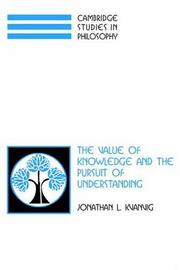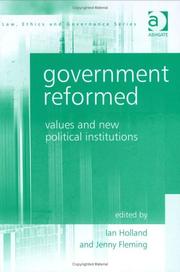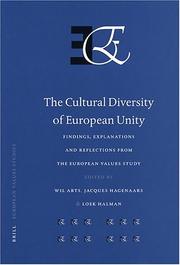| Listing 1 - 6 of 6 |
Sort by
|

ISBN: 0199261474 9780199261475 Year: 2003 Publisher: Oxford: Clarendon,
Abstract | Keywords | Export | Availability | Bookmark
 Loading...
Loading...Choose an application
- Reference Manager
- EndNote
- RefWorks (Direct export to RefWorks)
An exploration of a pervasive but puzzling aspect of our world: value. This work includes Berkeley Tanner Lectures delivered in 2001. It aims to make sense of the dependence of value on social practice, without falling back on cultural relativism. The Practice of Value explores the nature of value and its relation to the social and historical conditions under which human agents live. At the core of the book are the Tanner Lectures delivered at Berkeley in 2001 by Joseph Raz, who has been one of the leading figures in moral and legal philosophy since the 1970s. Raz argues that values depend importantly on social practices, but that we can make sense of this dependence without falling back on cultural relativism. In response, three eminent philosophers, Christine Korsgaard, Robert Pippin, and Bernard Williams, offer their own distinctive reflections on the connections between value and practice. The book begins with an introduction by Jay Wallace, setting the scene for what follows, and ends with a response from Raz to his commentators. The result is a fascinating debate, accessible to readers throughout and beyond philosophy, about the relations between human values and human life. The Tanner Lectures on Human Values, which are presented annually at each of nine universities in the United States and England, are among the most prestigious and notable events of the academic year. This volume inaugurates a new interdisciplinary series of books based on the Tanner Lectures given at the University of California, Berkeley. The series aims to make these distinguished lectures, and the lively debates stimulated by their presentation in Berkeley, available to a broad readership.
General ethics --- valeurs --- Values --- waarden --- Axiology --- Worth --- Aesthetics --- Knowledge, Theory of --- Metaphysics --- Psychology --- Ethics

ISBN: 1107138205 1280415444 0511169841 0511062664 0511206003 051149890X 0511297025 0511071124 9780511062667 9780511071126 0521827132 9780521827133 9780511498909 9780521037860 0521037867 9781107138209 9781280415449 9780511169847 9780511206009 9780511297021 Year: 2003 Publisher: Cambridge, UK ; New York, NY : Cambridge University Press,
Abstract | Keywords | Export | Availability | Bookmark
 Loading...
Loading...Choose an application
- Reference Manager
- EndNote
- RefWorks (Direct export to RefWorks)
Epistemology has for a long time focused on the concept of knowledge and tried to answer questions such as whether knowledge is possible and how much of it there is. Often missing from this inquiry, however, is a discussion on the value of knowledge. In The Value of Knowledge and the Pursuit of Understanding Jonathan Kvanvig argues that epistemology properly conceived cannot ignore the question of the value of knowledge. He also questions one of the most fundamental assumptions in epistemology, namely that knowledge is always more valuable than the value of its subparts. Taking Platos' Meno as a starting point of his discussion, Kvanvig tackles the different arguments about the value of knowledge and comes to the conclusion that knowledge is less valuable than generally assumed. Clearly written and well argued, this 2003 book will appeal to students and professionals in epistemology.
Knowledge, Theory of. --- Values. --- Axiology --- Worth --- Aesthetics --- Knowledge, Theory of --- Metaphysics --- Psychology --- Ethics --- Epistemology --- Theory of knowledge --- Philosophy --- Arts and Humanities

ISBN: 1138863084 1134472331 1280202149 0203220293 9780203220290 0415277647 9780415277648 9780415338264 0415338263 9781134472284 9781134472321 9781134472338 9781138863088 9780203060285 9781136001581 9781136001666 9781136001741 9781138181342 1134472323 Year: 2003 Volume: 6 Publisher: London New York Routledge
Abstract | Keywords | Export | Availability | Bookmark
 Loading...
Loading...Choose an application
- Reference Manager
- EndNote
- RefWorks (Direct export to RefWorks)
An exploration of the political, cultural and religious background of East and Southeast Asian societies and those of the West, with a view to seeing how they are affecting contemporary national and international politics.
Values --- Axiology --- Worth --- Aesthetics --- Knowledge, Theory of --- Metaphysics --- Psychology --- Ethics --- East Asia --- Southeast Asia --- Asia, Southeast --- Asia, Southeastern --- South East Asia --- Southeastern Asia --- Civilization. --- Politics and government. --- Religion. --- Geografie --- Sociale geografie --- Politieke Geografie.
Book
ISBN: 2802801473 2802803611 9782802801474 Year: 2003 Volume: 98 Publisher: Bruxelles: FUSL,
Abstract | Keywords | Export | Availability | Bookmark
 Loading...
Loading...Choose an application
- Reference Manager
- EndNote
- RefWorks (Direct export to RefWorks)
Sur le plan réflexif, le pluralisme des valeurs ne soulève apparemment aucune difficulté aujourd'hui. Traditionnellement il a toujours posé des problèmes de conflits et de hiérarchies. Afin de résoudre le premier problème, les valeurs ont été confinées dans l'espace de la vie privée ou soustraite à l'espace public et au test d'universalisation qui y « justifie » les institutions ; pour résoudre le second problème, on a entrepris la dévalorisation « généreuse » des valeurs ou leur proclamation a priori comme équivalentes. À reléguer les valeurs dans la sphère exclusive du privé, le risque est grand de les enfermer dans leur particularité, de leur permettre d'occuper ou prétendre occuper la place de l'universel sans aucune forme de confrontation et de gommer leur pluralité. À les relativiser purement et simplement, le risque n'est pas moins grand de voir la place de l'universel envahie, non par une quelconque valeur particulière, mais par ce qui se veut la mesure publique de toute qualité et appréciation aujourd'hui : les items de compétences. Face aux menaces qui pèsent sur le pluralisme des valeurs, sinon sur leur existence, les textes ici rassemblés réinterrogent entre autres ce que représentent les valeurs, leur pluralité, leurs liens, leurs conflits et leur prétention à l'universalité.
Values. --- Universaux --- Universals (Philosophy). --- General ethics --- Universals (Philosophy) --- Individuation (Philosophy) --- Individuation (Philosophy). --- Valeurs (Philosophie) --- Individu (Philosophie) --- Values --- #GOSA:V.A.M --- Axiology --- Worth --- Universals (Logic) --- Individuals (Philosophy) --- Individuation --- Particulars (Philosophy) --- Aesthetics --- Knowledge, Theory of --- Metaphysics --- Psychology --- Ethics --- Logic --- Philosophy --- Scholasticism --- Whole and parts (Philosophy) --- Haecceity (Philosophy) --- universel --- institution --- valeur --- particulier --- vie privée --- pluralisme des valeurs --- éthique publique --- espace public --- pluralisme culturel

Abstract | Keywords | Export | Availability | Bookmark
 Loading...
Loading...Choose an application
- Reference Manager
- EndNote
- RefWorks (Direct export to RefWorks)
Organizational change --- Public administration --- Values --- #SBIB:35H100 --- #SBIB:35H305 --- #SBIB:033.IO --- Axiology --- Worth --- Aesthetics --- Knowledge, Theory of --- Metaphysics --- Psychology --- Ethics --- Administration, Public --- Delivery of government services --- Government services, Delivery of --- Public management --- Public sector management --- Political science --- Administrative law --- Decentralization in government --- Local government --- Public officers --- Change, Organizational --- Organization development --- Organizational development --- Organizational innovation --- Management --- Organization --- Manpower planning --- Bestuurlijke organisatie: algemene werken --- Organisatieleer: organisatieverandering

ISSN: 15685926 ISBN: 9004122990 9786610464951 1417507187 128046495X 9047400038 9781417507184 9789004122994 Year: 2003 Volume: 6 Publisher: Leiden: Brill,
Abstract | Keywords | Export | Availability | Bookmark
 Loading...
Loading...Choose an application
- Reference Manager
- EndNote
- RefWorks (Direct export to RefWorks)
This work deals with the values of the people in contemporary Europe. Using the survey data from the European Values Study, a number of basic values and the dynamics of value change are explored from an economic, political, social, and religious-moral point of view.
Pluralism (Social sciences) --- Social change --- Values --- Civil society --- Group identity --- European Union. --- Cultural pluralism --- Philosophical anthropology --- Sociology of culture --- European Union --- Axiology --- Worth --- Aesthetics --- Knowledge, Theory of --- Metaphysics --- Psychology --- Ethics --- Change, Social --- Cultural change --- Cultural transformation --- Societal change --- Socio-cultural change --- Social history --- Social evolution --- Cultural diversity --- Diversity, Cultural --- Diversity, Religious --- Ethnic diversity --- Pluralism, Cultural --- Religious diversity --- Culture --- Cultural fusion --- Ethnicity --- Multiculturalism --- Social contract --- E.U. --- Pluralism (Social sciences) - European Union countries. --- Social change - European Union countries. --- Values - Europe. --- Civil society - Europe. --- Group identity - Europe.
| Listing 1 - 6 of 6 |
Sort by
|

 Search
Search Feedback
Feedback About UniCat
About UniCat  Help
Help News
News